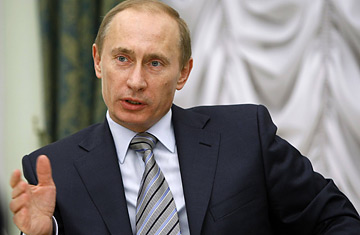
Russian President Vladimir Putin
(5 of 10)
TIME: What do you do for fun?
PUTIN: I don't have much time for leisure. I occasionally go to the theater. I like classical music: Brahms, Rachmaninoff, Tchaikovsky, Mozart, Schubert, Liszt. Beautiful tunes. What else? Every day for two hours I work out in the gym, usually in the morning or other times depending on my work schedule. That's about it, I guess. And I work.
TIME: Has your KGB training helped you as President? There's an old saying, once a spy, always a spy.
PUTIN: Well, those are lies. We're all human beings. Naturally some of that background can be of help. What was positive I think is that at my university and subsequently in the KGB where I was placed upon graduation from law school, they taught me to think independently. They taught me to gather information, objective information, first and foremost. To analyze this information and on the basis of objective information to adopt decisions independently. That's the first thing of a positive nature that I learned and use in my practice today. The second thing, from working in intelligence, is learning the skill of working with people. Above all, to respect the people you're dealing with. I will tell you something very intimate here about the workings of intelligence, of the basics of dealing with sources of information, with people who help special services, let's call them agents. There can be different sources of interest, of material support, different cases of dependence involved or unity of political views, but the most solid basis—without which it is not possible to do anything, for that matter, is trust and respect for the partner. One needs always to understand the person you are working with, at least to regard him as an equal to you and to understand that there are things he's better at than you. So when working with the people who cooperated with the Soviet intelligence community, I always thought that, above all, this person is better than me, at least for the reason that I don't have such risks in my life as he does. And this in itself made me respect greatly those individuals and I believe people sensed this attitude. I had good, kind relations with the people I worked with, and this respect is very important in politics as well.
TIME: And what about dealing with foreign journalists?
PUTIN: In the first place, what I might say about foreign journalists here, what I always liked about them, as a rule they are very professional people, many of whom are experts in the problems they are exploring, which is cause for respect. It's always interesting to deal with the people who know things in detail. They are exploring, that's interesting, but also I want to be frank with you here, whether you want to publish it or not I don't know, but I will share it with you. Some people in the Western or American press are simply working for the money they are paid. And they don't want to quarrel with their bosses. There are generally independent people who are not afraid of losing their jobs and will write their mind, but there are not many. I don't live with any journalists, but generally speaking they are very passionate people.
TIME: In Russia, a number of journalists have lost their lives in ways that are not quite understandable. Is there some kind of pattern? Is there something that you or the government can do to prevent it?
PUTIN: Well, I will be very frank in my answer. And I will not try to politicize my answer. I'm also very concerned. I will not tell you now what's going on in other countries regarding journalists, that they also perish in Iraq, for that matter, even more journalists have died there. But it's not the core of the matter. I don't want to shift the burden. Let's talk about Russia. There are many components involved in the matter. First, the journalist community is part of Russian society. There are folks who want to leave Russia, to make more money, and so forth. They want to use all the benefits of civilization for that matter, and under the circumstances when the initial accumulation of capital is taking place here, many people, including journalists, are tempted to make a little bit more money here and there, which means they get involved with entrepreneurs, sometimes with criminal businessmen. And they get involved, and start to protect the interests of certain circles against the interests of other groups. That's one group. And then there are genuine fighters against corruption, against the criminal elements. This is something the state should pay top attention to, and where such losses have occurred, I take them as my personal losses. Such people necessarily work for the interests of consolidation of Russia internally. We do whatever it takes to protect them, to ensure their security, and to work professionally as they should.
TIME: In which category would you put assassinated journalist Anna Politkovskaya?
PUTIN: Well, you know, each situation is unique. In the case of Politkovskaya, it was implied that she was a danger to the state. You know that's nonsense. If you're a Russian expert you know that Ms. Politkovskaya did not play any meaningful role in Russian political life. She was no threat, no danger whatsoever. Her murder was a provocation against the authorities, I believe. Nobody ever so much as mentioned her until she was killed. Her activities were known within just a restricted circle of people. You could count them all on one hand—but now the entire country and the whole world are talking about her. I see it as deliberate provocation: they chose a sacrifice and destroyed a woman. Still, we'll do whatever it takes to complete this investigation to the successful end.